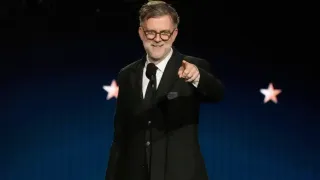April 28, 2015
Controversial Casting of 'JC Superstar's' Mary Magdaline Upsets Some
Michael Cox READ TIME: 10 MIN.
"'Jesus Christ Superstar' is always cast the same way," says Roderick Ferguson, Parliamentarian of the Show Tunes Club of Boston. "Jesus is hot and Mary has a big rack."
Putting convention aside, Fiddlehead Theatre Company has created quite a buzz with some non-traditional casting in their current production of the classic rock opera. (The show runs through May 3 at the historic Strand Theatre in Dorchester.) In Fiddlehead's version Mary has a small to average sized chest.
"I'm only a Size B. As in 'Boy,'" says Scott Caron, the performer cast in the role of Mary Magdalene, a female disciple of Jesus and one of the show's leading roles. "If they were huge it wouldn't be realistic. My extra parts should be as natural looking and feeling as possible. Our conception is to make my boobs subtle."
In a show where there is only one named role for a woman, director Stacey Stephens has decided to cast a man as the Savior's soul female apostle, and some people within the community are questioning his decision. Caron not only feels that the company's choice was a good one, but that their production of the show is ultimately pro-feminist and socially active. Stephens believes that his non-tradition casting can enhance the audience's understanding of the traditional story. But when all is said and done how will audiences actually react?
A modern day Christ story
A swam of controversy surrounded "Jesus Christ Superstar" when it was conceived of in the early 1970s. People felt that putting Jesus in bellbottoms and having him speak in modern slang was a bad idea. In addition, composer Andrew Lloyd Webber and lyricist Tim Rice wanted to tell "the greatest story ever told" as the gospel according to Judas Iscariot, the legendary villain who betrayed the Messiah. But a brilliant score, changed audiences' minds, and the show became a long running hit.
Fiddlehead has chosen to update the story of Jesus to the 21st Century, just after the attack on the World Trade Center in New York. Stephens describes his conception of the show: "What if an ordinary guy did something miraculous? He survives 9/11 and saves others in the process. And what if -- divine or not; the play doesn't specify -- he's on the news programs and his face is plastered all over. What does that do to someone? What does that do to your head? Do you start believing your own press?
"Christ gets on a media wave and he starts taking steps up the ladder," continues Stephens, "And he starts doing things -- like Christ did -- that piss the government and the religious sector off."
Befriending Mary Magdalene is one of the things Christ does to upset people. The community at large feels that Christ's relationship with Mary is inappropriate. Mary is an outcast, a sinner and a second-class citizen, but Christ tells his followers that she should be treated with the exact same respect as the Son of God.
"My choice in casting Mary Magdalene is going to raise some eyebrows, but I put a lot of thought into this," explains Stephens. "Here is a person where the exterior is one thing and the interior is something else. It makes so much sense to me that Mary is a woman trapped in a man's body." So the director chose to make Mary's character a man transitioning into a woman.
"I bounced the idea off a lot of different people," continues Stephens. "By and large this idea resonated with people I spoke to in the strait, religious and gay communities. And it resonated most with the most religious people. At that point I was like, This is the right decision.
Playing with gender
"Playing with gender has always been a part of the theatre," says Erin Eva Butcher, the artistic director of Maiden Phoenix Theatre Company an organization committed to telling stories about women. "And I think [Stephens has made] an interesting choice. But I think this is going to upset a lot of people."
"One of my favorite parts of the musical theatre is strong female characters. And there are a lot of them," says Caron. It's true that when you think of the great roles in the strait theatre you think of Hamlet, James Tyrone and Willy Loman, but in the musical theatre you think of roles like Maria von Trapp, Fanny Brice and Mama Rose.
"Here we are doing 'Jesus Christ Superstar,' a show that notably only has one female character, and here I am taking the role," considers Caron. "That's just not the battle that we're fighting here. But on a larger level it's a similar battle because the [individuals] who go through transition are female. This show is inspiring us to broaden our perspective on what a woman is."
Butcher supports giving visibility to a group of people who don't get much visibility but asks, "If this is set in modern times, why can't some of the Apostles be women?"
"Our Peter is played by a woman," says Stephens, "so it balances out."
"We've done a few things with gender casting in the show," notes Caron. "No one else is playing a transgendered person, but they've cast a few of the men's roles as women. And personally, that's how I would cast a lot of things, without trying to make any statement in the process."
"And all of our apostles are not men," adds Stephens. "Not because we didn't have the men, but because in today's world it wouldn't be an all-boys club."
"I really appreciate it when companies include more women in their casts," Butcher responds to this information. "but I wish they would include them more prominently, rather than as periphery characters. Like the role of Judas, those notes are so high; a woman could easily sing that. I would love to see a woman playing Judas. Or a woman playing Jesus."
The sex worker debate
"I wonder if people will be offended," Butcher postulates, "because Mary Magdalene is wrongly considered a prostitute." She explains that patriarchal scholars in the Catholic Church labeled Mary as a sex worker due to her association with a prostitute in a previous passage of the Bible.
"Mary is referred to as a prostitute in the show," Stephens tells us. "So we've worked with that. In many cases, transgendered people have been sexually abused and they can't get jobs in the corporate world, so they often fall into [sex work] because there's a market for that."
"That can be a little tricky," says Butcher, "because you're kind of playing into a stereotype about transgendered people. I feel like it's going to make a lot of people mad."
In spite of this, Stephens feels that the overall metaphor of Mary as a prostitute enhances an audiences understanding of selfless love. "Christ is the first person who's loved Mary for who she is as opposed to what she is. 'This may be the first time,' I said to Scott, 'that you've touched someone for love as opposed to touching him for money.'"
Modern theologians like Hubert Wolf, author of "The Nuns of Sant'Ambrogio," suggest that fear and the demonization of female sexuality may be one of the reasons the Church labeled Mary as a prostitute.
"Mary Magdalene was a prominent follower of Jesus," explains Butcher, "and the Church was not comfortable with Mary playing such a pivotal role among the apostles."
"It's kind of a smear campaign," she adds. "The women of the Bible were not treated kindly by subsequent generations."
What kind of a man can be a woman?
"I hope [this casting] is not just a token: 'Look! We have a transgendered character,'" Butcher worries. "I hope they have a reason for this casting and they're going to make it a part of the full show."
Though Butcher's theatre company is dedicate to "having at least 51% female involvement in all aspects" of play production, she wouldn't be opposed to casting a genetically male person as a woman. "If a male-to-female transgendered person came to audition for a role in my company," Butcher admits, "and she was a good actor, I would definitely cast her as a woman. In my casting process, it's more about how someone identifies rather than what gender they were born as."
Then she learns that Scott is not a transgendered actor.
"Just a guy playing a transgendered Mary Magdalene that's not transgendered?" she questions. "This could be really bad for [Fiddlehead]. I feel that a lot of people could get really angry about that, especially if they don't do it authentically. I wonder why they're choosing to go so controversial with a piece that is already so controversial."
"I said from the beginning," assures Stephens, "this cannot be a drag queen's interpretation. I wouldn't want to see that and that would be so disrespectful to what we're trying to portray."
"There's so many layers to this character," Scott says. "The idea is not, in any way, to poke fun. That's the opposite of what we're trying to do here."
"I told Scott," Stephens continues, "pardon the pun -- 'not only will you be crucified by the critics, but our entire company will be if this is not done with the utmost dignity and realness.' Scott not only understands Mary, but he has a real gut connection to her. This isn't the story of a transgendered person. Mary is a woman and Scott is playing her. This is a story about him... her... HER... finding love and acceptance through Christ."
Does the casting work for audiences?
"My look dictates what I do in almost every show I'm cast in," Caron elucidates on how actors more than almost any other profession are hired based on their appearance, men as well as women. "I do side roles, not leads. I usually come in for one song, make everyone laugh and have a running joke for the entire show. In 'Jesus Christ Superstar,' I'm one of the top three roles and it requires all my 15 years of voice training.
"For guys that look like me, the golden standard is to play Seymour in 'Little Shop of Horrors,'" he continues. "I've always wanted to play Seymour. But after I started working on this show -- and after I started being challenged to create something deep and real within a role -- I'm less interested in playing roles like that."
Landon Chicazery was in the audience on opening night. He and his sister have seen "Jesus Christ Superstar" several times in both regional and professional productions, and he has to admit that he was startled by Stephens' casting decision. He describes his experience:
"Mary starts singing and everyone in the audience is like, 'Holy shit, this is a dude,'" Chicazery remembers. "My sister, who loves this show and has seen it a lot, looks over at me like, 'What's going on? What are they trying to do?' The whole audience was like that.
"Then at one point, [Caron] trips on his high heels and almost does a face plant. The whole audience busts out laughing.
"I was embarrassed. I felt bad for the guy.
"This guy is singing, 'Everything's alright, everything's alright,' and 'Try not to worry about things that upset you.' And I felt like, he's singing this to try to convince himself, not Jesus.
"But he just picks himself up and keeps singing. And he actually sounds really good. And I thought, Damn, she has courage.
"Everyone treats Mary like a freak. And here's Peter and Judas saying, 'Keep it on the down low, Jesus, we've got to protect ourselves.' But Mary is the only one that says, 'You've got to stand up for what you believe in.' And she does. She's an example for Jesus just by being herself. I'd never looked at the story that way before."
"Playing Mary is massive for me," Caron states unequivocally. "So far in my professional career I haven't had the opportunity to do work that is personal to me or speaks to me inside. I don't get to play deep roles.
"There's a lot to this role and it's stuff that I don't get to do on stage," considers Caron, "so often I'm playing into an archetype. It's all about the joke. This role is personal to me, not the butt of a joke."
"Jesus Christ Superstar" runs through May 3 at the historic Strand Theatre (543 Columbia Road, Dorchester, MA). For more information and tickets visit www.fiddleheadtheatre.com or call 617-229-6494.






